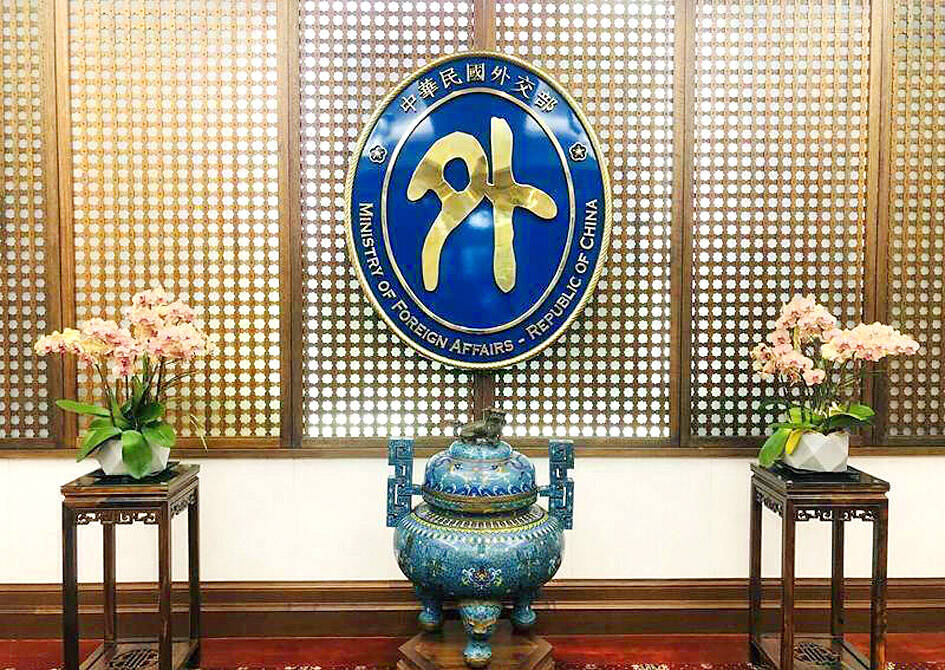Taiwan is hoping the latest extension of a provisional agreement on bishop appointments between the Holy See and China would help promote religious freedom on the other side of the Taiwan Strait, the Ministry of Foreign Affairs (MOFA) said yesterday.
On Tuesday, the Holy See and China extended the Provisional Agreement on the Appointment of Bishops for another four years. The agreement, first signed in 2018, had been extended twice: in 2020 and 2022.
“In light of the consensus reached for an effective application of the Provisional Agreement regarding the Appointment of Bishops, after appropriate consultation and assessment, the Holy See and the People’s Republic of China have agreed to extend further its validity for four years from the present date,” the Vatican said in a statement.

Photo: Taipei Times file
“The Vatican Party remains dedicated to furthering the respectful and constructive dialogue with the Chinese Party, in view of the further development of bilateral relations for the benefit of the Catholic Church in China and the Chinese people as a whole,” it said.
The agreement allows the pope to have the final say on the appointment of bishops in China, a key provision for the Vatican in its desire to mitigate Beijing’s influence on Catholic churches.
Asked to comment on the latest extension, MOFA said in a statement yesterday that Taiwan, which respects religious freedom, hopes the accord “will help reverse the increasing deterioration of religious freedom in China.”
Despite the Vatican’s wish to improve religious freedom in China with the 2018 agreement, “the Chinese government has stepped up measures to persecute local Catholic communities as religious freedom and human rights continue to deteriorate in China,” the ministry said.
“Many bishops and other clergy have been forced to join the Chinese Communist Party [CCP]-controlled Chinese Patriotic Catholic Association, with many Chinese Catholics facing formidable challenges to both their consciences and freedom of belief,” the ministry said.
However, a Vatican-based expert familiar with Holy See-China relations said the ongoing agreement has resulted in China revising its hardcore stance in insisting that foreign forces cannot interfere with Chinese clergies.
“In the past, the CCP has always insisted that clergy should not be controlled and interfered by foreign forces,” the expert said under condition of anonymity.
“But now there is concrete evidence showing that Beijing has softened the stance and that the pope has the final say on the appointment of Chinese bishops,” the expert said.
The CCP’s churches and bishops are now moving toward communion with the universal church, breaking the CCP’s past iron law of religious autonomy, the unnamed expert said.
The expert was referring to the period prior to the first agreement in 2018, when only clandestine churches would pledge loyalty to the pope. Under the deal, state churches could recognize the pontiff as the supreme leader of the church.
The deal was seen as a breakthrough at the time, with some people speculating that it could lead to the Vatican formally recognizing Beijing diplomatically and threaten Taiwan’s official ties with the Holy See.
The Holy See is one of 12 sovereign entities that maintain full diplomatic ties with Taiwan.
It is also the only European state to do so, although its relations with Beijing have warmed under the leadership of Pope Francis.
MOFA yesterday said it would closely monitor related developments and continue to work with the Holy See and the Catholic Church to enhance humanitarian cooperation and jointly safeguard the core value of religious freedom.

Beijing could eventually see a full amphibious invasion of Taiwan as the only "prudent" way to bring about unification, the US Department of Defense said in a newly released annual report to Congress. The Pentagon's "Annual Report to Congress: Military and Security Developments Involving the People's Republic of China 2025," was in many ways similar to last year’s report but reorganized the analysis of the options China has to take over Taiwan. Generally, according to the report, Chinese leaders view the People's Liberation Army's (PLA) capabilities for a Taiwan campaign as improving, but they remain uncertain about its readiness to successfully seize

Taiwan is getting a day off on Christmas for the first time in 25 years. The change comes after opposition parties passed a law earlier this year to add or restore five public holidays, including Constitution Day, which falls on today, Dec. 25. The day marks the 1947 adoption of the constitution of the Republic of China, as the government in Taipei is formally known. Back then the Chinese Nationalist Party (KMT) governed China from Nanjing. When the KMT, now an opposition party in Taiwan, passed the legislation on holidays, it said that they would help “commemorate the history of national development.” That

Taiwan has overtaken South Korea this year in per capita income for the first time in 23 years, IMF data showed. Per capita income is a nation’s GDP divided by the total population, used to compare average wealth levels across countries. Taiwan also beat Japan this year on per capita income, after surpassing it for the first time last year, US magazine Newsweek reported yesterday. Across Asia, Taiwan ranked fourth for per capita income at US$37,827 this year due to sustained economic growth, the report said. In the top three spots were Singapore, Macau and Hong Kong, it said. South

Snow fell on Yushan (Jade Mountain, 玉山) yesterday morning as a continental cold air mass sent temperatures below freezing on Taiwan’s tallest peak, the Central Weather Administration (CWA) said. Snowflakes were seen on Yushan’s north peak from 6:28am to 6:38am, but they did not fully cover the ground and no accumulation was recorded, the CWA said. As of 7:42am, the lowest temperature recorded across Taiwan was minus-5.5°C at Yushan’s Fengkou observatory and minus-4.7°C at the Yushan observatory, CWA data showed. On Hehuanshan (合歡山) in Nantou County, a low of 1.3°C was recorded at 6:39pm, when ice pellets fell at Songsyue Lodge (松雪樓), a